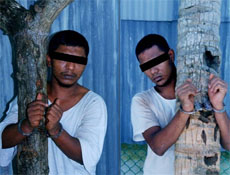Former Prisons Division Head with the Department of Penitentiary and Rehabilitation Serivces (DPRS) Isthafa Ibrahim Manik has been detained and questioned by police, after disturbing photographs of tortured victims in custody were obtained by the Presidential Commission and leaked to the media.
Manik remains in custody at Maafushi after the courts granted police a 15-day extension of detention.
The photos released so far include images of men tied to coconut palms, caged, and bloodied. One of the photos, of a prisoner lying on a blood-soaked mattress, has a 2001 date stamp.
A senior government official told Minivan News that the photos were obtained by the Commission from the DPRS itself on Monday, and that those released “are just the tip of the iceberg.”
Inspector of Police Abdulla Nawaz confirmed in a statement to the state broadcaster MNBC that the matter involved severe cases of torture and suspected fatalities, and had been passed to police.
“Former heads of the Prisons Division will be interrogated,” he said. “We will also question former ministers if it is believed that they were involved,” he added, claiming that police would withhold the identities of some of those summoned for questioning.

National Security Advisor and former Defence Minister Ameen Faisal, a member of the Presidential Commission, told MNBC that prison records had revealed that inmates were punished without court order “and subjected to inhumane torture and ill-treatment.”
“This commission has received information that some inmates who were tortured ended up dead,” Faisal said.
Many members of the current government, including President Mohamed Nasheed and Foreign Minister Ahmed Naseem, claim to have been tortured under the former administration.
“They were limited only by their imagination,” Naseem said, describing the describing the former government’s treatment of prisoners as “medieval”.
Gayoom’s spokesperson Mohamed Hussein ‘Mundhu’ Shareef told Haveeru that the government’s arrest of the former head of prisons was the “the third part of the drama” in a long-plotted lead up to the arrest of the former president.
“The attempt to arrest President Maumoon will only boost his profile. We see this simply as the government’s attempt to divert the people’s attention from the dollar crisis and rising commodity prices,” Shareef told Haveeru.
The Presidential Commission has previously summoned Gayoom, who refused to appear.
In October 2010, President Nasheed’s high profile support of elderly historian Ahmed Shafeeq, who has alleged that 111 people died in custody under the former administration and that he himself had been arrested and his diaries destroyed, prompted Gayoom to write to the British Prime Minister David Cameron.
In the letter, Gayoom appealed for pressure to be placed on President Mohamed Nasheed following “the escalation of attempts to harass and intimidate me and my family.”
The matter, he told the British PM, involved “unsubstantiated allegations by an elderly man by the name of Ahmed Shafeeq that I had, during my tenure as President, ordered the murder of 111 dissidents.”
“In a book authored by this Shafeeq, which was ceremoniously released [on October 10] by Mohamed Nasheed himself, it is accused that I also ordered the man’s arrest and supposed torture in prison. In a country of just over 300,000, it is safe to assume that even one ‘missing person’ would not go unnoticed, let alone 111.”

Nasheed’s government had “escalated its attempts to harass me” in the run up to the local council elections, Gayoom wrote, despite his retirement from politics.
“After the government’s defeat in last year’s parliamentary elections, the popularity ratings of the ruling MDP have fallen further in recent months as a result of the government’s failure to deliver on its campaign promises, and its lack of respect for the law.”
“On the other hand,” Gayoom told the British PM, “I continue to enjoy the strong support, love and affection of the people, and have been voted by the public as ‘Personality of the Year’ in both years since stepping down from the presidency.”